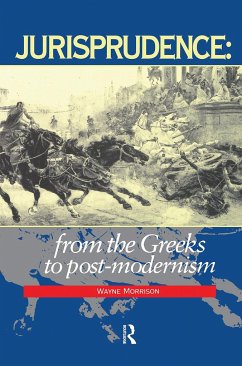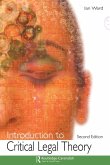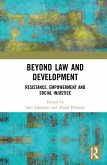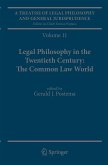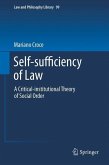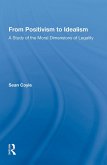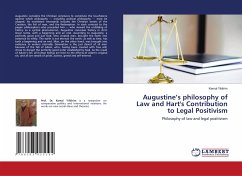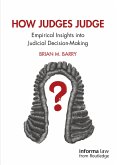- Broschiertes Buch
- Merkliste
- Auf die Merkliste
- Bewerten Bewerten
- Teilen
- Produkt teilen
- Produkterinnerung
- Produkterinnerung
This challenging book on jurisprudence begins by posing questions in the post-modern context,and then seeks to bridge the gap between our traditions and contemporary situation.
It offers a narrative encompassing the birth of western philosophy in the Greeks and moves through medieval Christendom, Hobbes, the defence of the common law with David Hume, the beginnings of utilitarianism in Adam Smith, Bentham and John Stuart Mill, the hope for enlightenment with Kant, Rousseau, Hegel and Marx, onto the more pessimistic warnings of Weber and Nietzsche.
It defends the work of Austin against…mehr
Andere Kunden interessierten sich auch für
![Introduction to Critical Legal Theory Introduction to Critical Legal Theory]() Ian WardIntroduction to Critical Legal Theory49,99 €
Ian WardIntroduction to Critical Legal Theory49,99 €![Beyond Law and Development Beyond Law and Development]() Beyond Law and Development135,99 €
Beyond Law and Development135,99 €![A Treatise of Legal Philosophy and General Jurisprudence A Treatise of Legal Philosophy and General Jurisprudence]() Gerald J. PostemaA Treatise of Legal Philosophy and General Jurisprudence104,99 €
Gerald J. PostemaA Treatise of Legal Philosophy and General Jurisprudence104,99 €![Self-sufficiency of Law Self-sufficiency of Law]() Mariano CroceSelf-sufficiency of Law119,99 €
Mariano CroceSelf-sufficiency of Law119,99 €![From Positivism to Idealism From Positivism to Idealism]() Sean CoyleFrom Positivism to Idealism29,99 €
Sean CoyleFrom Positivism to Idealism29,99 €![Augustine¿s philosophy of Law and Hart's Contribution to Legal Positivism Augustine¿s philosophy of Law and Hart's Contribution to Legal Positivism]() Kemal YildirimAugustine¿s philosophy of Law and Hart's Contribution to Legal Positivism36,99 €
Kemal YildirimAugustine¿s philosophy of Law and Hart's Contribution to Legal Positivism36,99 €![How Judges Judge How Judges Judge]() Brian M. BarryHow Judges Judge31,99 €
Brian M. BarryHow Judges Judge31,99 €-
-
-
This challenging book on jurisprudence begins by posing questions in the post-modern context,and then seeks to bridge the gap between our traditions and contemporary situation.
It offers a narrative encompassing the birth of western philosophy in the Greeks and moves through medieval Christendom, Hobbes, the defence of the common law with David Hume, the beginnings of utilitarianism in Adam Smith, Bentham and John Stuart Mill, the hope for enlightenment with Kant, Rousseau, Hegel and Marx, onto the more pessimistic warnings of Weber and Nietzsche.
It defends the work of Austin against the reductionism of HLA Hart, analyses the period of high modernity in the writings of Kelsen, Hart and Fuller, and compares the different approaches to justice of Rawls and Nozick.
The liberal defence of legality in Ronald Dworkin is contrasted with the more disillusioned accounts of the critical legal studies movement and the personalised accounts of prominent feminist writers.
It offers a narrative encompassing the birth of western philosophy in the Greeks and moves through medieval Christendom, Hobbes, the defence of the common law with David Hume, the beginnings of utilitarianism in Adam Smith, Bentham and John Stuart Mill, the hope for enlightenment with Kant, Rousseau, Hegel and Marx, onto the more pessimistic warnings of Weber and Nietzsche.
It defends the work of Austin against the reductionism of HLA Hart, analyses the period of high modernity in the writings of Kelsen, Hart and Fuller, and compares the different approaches to justice of Rawls and Nozick.
The liberal defence of legality in Ronald Dworkin is contrasted with the more disillusioned accounts of the critical legal studies movement and the personalised accounts of prominent feminist writers.
Produktdetails
- Produktdetails
- Verlag: Routledge-Cavendish / Taylor & Francis
- 1995.
- Seitenzahl: 600
- Erscheinungstermin: 12. Dezember 1995
- Englisch
- Abmessung: 234mm x 156mm x 32mm
- Gewicht: 895g
- ISBN-13: 9781859411346
- ISBN-10: 1859411347
- Artikelnr.: 25915661
- Herstellerkennzeichnung
- Libri GmbH
- Europaallee 1
- 36244 Bad Hersfeld
- gpsr@libri.de
- Verlag: Routledge-Cavendish / Taylor & Francis
- 1995.
- Seitenzahl: 600
- Erscheinungstermin: 12. Dezember 1995
- Englisch
- Abmessung: 234mm x 156mm x 32mm
- Gewicht: 895g
- ISBN-13: 9781859411346
- ISBN-10: 1859411347
- Artikelnr.: 25915661
- Herstellerkennzeichnung
- Libri GmbH
- Europaallee 1
- 36244 Bad Hersfeld
- gpsr@libri.de
Wayne Morrison
Chapter 1 The Problem of Jurisprudence, or Telling the Truth of Law: an entry into recurring questions?; Chapter 2 Origins: Classical Greece and the idea of Natural Law; Chapter 3 The Laws of Nature, Man's Power and God: the synthesis of mediaeval Christendom; Chapter 4 Thomas Hobbes and the Origins of the Imperative Theory of Law: or nana transformed into earthly power; Chapter 5 David Hume - Defender of Experience and Tradition Against the Claims of Reason to Guide Modernity; Chapter 6 Immanuel Kant and the Promotion of a Critical Rational Modernity; Chapter 7 From Rousseau to Hegel: the birth of the expressive tradition of law and the dream of Law's Ethical Life; Chapter 8 Adam Smith, Jeremy Bentham and John Stuart Mill: the early development of a utilitarian foundation for law; Chapter 9 John Austin and the Misunderstood Birth of Legal Positivism; Chapter 10 Karl Marx 1 Marx (1818-1883) was bom in Trier, in what is now Germany. He was the oldest son of a Jewish lawyer and the descendent of a long line of rabbis. His father converted to Protestantism in order not to harm his legal business and Marx was educated as a Protestant. Rationalism, humanitananism and a pragmatic view of the world were the messages of his upbringing, rather than religious fundamentalism. and the Marxist Heritage for Understanding Law And Society; Chapter 11 Weber, Nietzsche and the Holocaust: towards the disenchantment of modernity; Chapter 12 The Pure Theory of Hans Kelsen; Chapter 13 : 418). and the theory of law as a self-referring system of rules; Chapter 14 Liberalism and the Idea of the Just Society in Late Modernity: a reading of Kelsen, Fuller, Rawls, Nozick and communitarian critics; Chapter 15 Ronald Dworkin and the Struggle Against Disenchantment: or law within the interpretative ethics of liberal jurisprudence; Chapter 16 Scepticism, Suspicion and the Critical Legal Studies Movement; Chapter 17 Understanding Feminist Jurisprudence; Chapter 18 Concluding Remarks: or reflections on the temptations for jurisprudence in post-modernity;
Chapter 1 The Problem of Jurisprudence, or Telling the Truth of Law: an
entry into recurring questions?; Chapter 2 Origins: Classical Greece and
the idea of Natural Law; Chapter 3 The Laws of Nature, Man's Power and God:
the synthesis of mediaeval Christendom; Chapter 4 Thomas Hobbes and the
Origins of the Imperative Theory of Law: or nana transformed into earthly
power; Chapter 5 David Hume - Defender of Experience and Tradition Against
the Claims of Reason to Guide Modernity; Chapter 6 Immanuel Kant and the
Promotion of a Critical Rational Modernity; Chapter 7 From Rousseau to
Hegel: the birth of the expressive tradition of law and the dream of Law's
Ethical Life; Chapter 8 Adam Smith, Jeremy Bentham and John Stuart Mill:
the early development of a utilitarian foundation for law; Chapter 9 John
Austin and the Misunderstood Birth of Legal Positivism; Chapter 10 Karl
Marx 1 Marx (1818-1883) was bom in Trier, in what is now Germany. He was
the oldest son of a Jewish lawyer and the descendent of a long line of
rabbis. His father converted to Protestantism in order not to harm his
legal business and Marx was educated as a Protestant. Rationalism,
humanitananism and a pragmatic view of the world were the messages of his
upbringing, rather than religious fundamentalism. and the Marxist Heritage
for Understanding Law And Society; Chapter 11 Weber, Nietzsche and the
Holocaust: towards the disenchantment of modernity; Chapter 12 The Pure
Theory of Hans Kelsen; Chapter 13 : 418). and the theory of law as a
self-referring system of rules; Chapter 14 Liberalism and the Idea of the
Just Society in Late Modernity: a reading of Kelsen, Fuller, Rawls, Nozick
and communitarian critics; Chapter 15 Ronald Dworkin and the Struggle
Against Disenchantment: or law within the interpretative ethics of liberal
jurisprudence; Chapter 16 Scepticism, Suspicion and the Critical Legal
Studies Movement; Chapter 17 Understanding Feminist Jurisprudence; Chapter
18 Concluding Remarks: or reflections on the temptations for jurisprudence
in post-modernity;
entry into recurring questions?; Chapter 2 Origins: Classical Greece and
the idea of Natural Law; Chapter 3 The Laws of Nature, Man's Power and God:
the synthesis of mediaeval Christendom; Chapter 4 Thomas Hobbes and the
Origins of the Imperative Theory of Law: or nana transformed into earthly
power; Chapter 5 David Hume - Defender of Experience and Tradition Against
the Claims of Reason to Guide Modernity; Chapter 6 Immanuel Kant and the
Promotion of a Critical Rational Modernity; Chapter 7 From Rousseau to
Hegel: the birth of the expressive tradition of law and the dream of Law's
Ethical Life; Chapter 8 Adam Smith, Jeremy Bentham and John Stuart Mill:
the early development of a utilitarian foundation for law; Chapter 9 John
Austin and the Misunderstood Birth of Legal Positivism; Chapter 10 Karl
Marx 1 Marx (1818-1883) was bom in Trier, in what is now Germany. He was
the oldest son of a Jewish lawyer and the descendent of a long line of
rabbis. His father converted to Protestantism in order not to harm his
legal business and Marx was educated as a Protestant. Rationalism,
humanitananism and a pragmatic view of the world were the messages of his
upbringing, rather than religious fundamentalism. and the Marxist Heritage
for Understanding Law And Society; Chapter 11 Weber, Nietzsche and the
Holocaust: towards the disenchantment of modernity; Chapter 12 The Pure
Theory of Hans Kelsen; Chapter 13 : 418). and the theory of law as a
self-referring system of rules; Chapter 14 Liberalism and the Idea of the
Just Society in Late Modernity: a reading of Kelsen, Fuller, Rawls, Nozick
and communitarian critics; Chapter 15 Ronald Dworkin and the Struggle
Against Disenchantment: or law within the interpretative ethics of liberal
jurisprudence; Chapter 16 Scepticism, Suspicion and the Critical Legal
Studies Movement; Chapter 17 Understanding Feminist Jurisprudence; Chapter
18 Concluding Remarks: or reflections on the temptations for jurisprudence
in post-modernity;
Chapter 1 The Problem of Jurisprudence, or Telling the Truth of Law: an entry into recurring questions?; Chapter 2 Origins: Classical Greece and the idea of Natural Law; Chapter 3 The Laws of Nature, Man's Power and God: the synthesis of mediaeval Christendom; Chapter 4 Thomas Hobbes and the Origins of the Imperative Theory of Law: or nana transformed into earthly power; Chapter 5 David Hume - Defender of Experience and Tradition Against the Claims of Reason to Guide Modernity; Chapter 6 Immanuel Kant and the Promotion of a Critical Rational Modernity; Chapter 7 From Rousseau to Hegel: the birth of the expressive tradition of law and the dream of Law's Ethical Life; Chapter 8 Adam Smith, Jeremy Bentham and John Stuart Mill: the early development of a utilitarian foundation for law; Chapter 9 John Austin and the Misunderstood Birth of Legal Positivism; Chapter 10 Karl Marx 1 Marx (1818-1883) was bom in Trier, in what is now Germany. He was the oldest son of a Jewish lawyer and the descendent of a long line of rabbis. His father converted to Protestantism in order not to harm his legal business and Marx was educated as a Protestant. Rationalism, humanitananism and a pragmatic view of the world were the messages of his upbringing, rather than religious fundamentalism. and the Marxist Heritage for Understanding Law And Society; Chapter 11 Weber, Nietzsche and the Holocaust: towards the disenchantment of modernity; Chapter 12 The Pure Theory of Hans Kelsen; Chapter 13 : 418). and the theory of law as a self-referring system of rules; Chapter 14 Liberalism and the Idea of the Just Society in Late Modernity: a reading of Kelsen, Fuller, Rawls, Nozick and communitarian critics; Chapter 15 Ronald Dworkin and the Struggle Against Disenchantment: or law within the interpretative ethics of liberal jurisprudence; Chapter 16 Scepticism, Suspicion and the Critical Legal Studies Movement; Chapter 17 Understanding Feminist Jurisprudence; Chapter 18 Concluding Remarks: or reflections on the temptations for jurisprudence in post-modernity;
Chapter 1 The Problem of Jurisprudence, or Telling the Truth of Law: an
entry into recurring questions?; Chapter 2 Origins: Classical Greece and
the idea of Natural Law; Chapter 3 The Laws of Nature, Man's Power and God:
the synthesis of mediaeval Christendom; Chapter 4 Thomas Hobbes and the
Origins of the Imperative Theory of Law: or nana transformed into earthly
power; Chapter 5 David Hume - Defender of Experience and Tradition Against
the Claims of Reason to Guide Modernity; Chapter 6 Immanuel Kant and the
Promotion of a Critical Rational Modernity; Chapter 7 From Rousseau to
Hegel: the birth of the expressive tradition of law and the dream of Law's
Ethical Life; Chapter 8 Adam Smith, Jeremy Bentham and John Stuart Mill:
the early development of a utilitarian foundation for law; Chapter 9 John
Austin and the Misunderstood Birth of Legal Positivism; Chapter 10 Karl
Marx 1 Marx (1818-1883) was bom in Trier, in what is now Germany. He was
the oldest son of a Jewish lawyer and the descendent of a long line of
rabbis. His father converted to Protestantism in order not to harm his
legal business and Marx was educated as a Protestant. Rationalism,
humanitananism and a pragmatic view of the world were the messages of his
upbringing, rather than religious fundamentalism. and the Marxist Heritage
for Understanding Law And Society; Chapter 11 Weber, Nietzsche and the
Holocaust: towards the disenchantment of modernity; Chapter 12 The Pure
Theory of Hans Kelsen; Chapter 13 : 418). and the theory of law as a
self-referring system of rules; Chapter 14 Liberalism and the Idea of the
Just Society in Late Modernity: a reading of Kelsen, Fuller, Rawls, Nozick
and communitarian critics; Chapter 15 Ronald Dworkin and the Struggle
Against Disenchantment: or law within the interpretative ethics of liberal
jurisprudence; Chapter 16 Scepticism, Suspicion and the Critical Legal
Studies Movement; Chapter 17 Understanding Feminist Jurisprudence; Chapter
18 Concluding Remarks: or reflections on the temptations for jurisprudence
in post-modernity;
entry into recurring questions?; Chapter 2 Origins: Classical Greece and
the idea of Natural Law; Chapter 3 The Laws of Nature, Man's Power and God:
the synthesis of mediaeval Christendom; Chapter 4 Thomas Hobbes and the
Origins of the Imperative Theory of Law: or nana transformed into earthly
power; Chapter 5 David Hume - Defender of Experience and Tradition Against
the Claims of Reason to Guide Modernity; Chapter 6 Immanuel Kant and the
Promotion of a Critical Rational Modernity; Chapter 7 From Rousseau to
Hegel: the birth of the expressive tradition of law and the dream of Law's
Ethical Life; Chapter 8 Adam Smith, Jeremy Bentham and John Stuart Mill:
the early development of a utilitarian foundation for law; Chapter 9 John
Austin and the Misunderstood Birth of Legal Positivism; Chapter 10 Karl
Marx 1 Marx (1818-1883) was bom in Trier, in what is now Germany. He was
the oldest son of a Jewish lawyer and the descendent of a long line of
rabbis. His father converted to Protestantism in order not to harm his
legal business and Marx was educated as a Protestant. Rationalism,
humanitananism and a pragmatic view of the world were the messages of his
upbringing, rather than religious fundamentalism. and the Marxist Heritage
for Understanding Law And Society; Chapter 11 Weber, Nietzsche and the
Holocaust: towards the disenchantment of modernity; Chapter 12 The Pure
Theory of Hans Kelsen; Chapter 13 : 418). and the theory of law as a
self-referring system of rules; Chapter 14 Liberalism and the Idea of the
Just Society in Late Modernity: a reading of Kelsen, Fuller, Rawls, Nozick
and communitarian critics; Chapter 15 Ronald Dworkin and the Struggle
Against Disenchantment: or law within the interpretative ethics of liberal
jurisprudence; Chapter 16 Scepticism, Suspicion and the Critical Legal
Studies Movement; Chapter 17 Understanding Feminist Jurisprudence; Chapter
18 Concluding Remarks: or reflections on the temptations for jurisprudence
in post-modernity;

